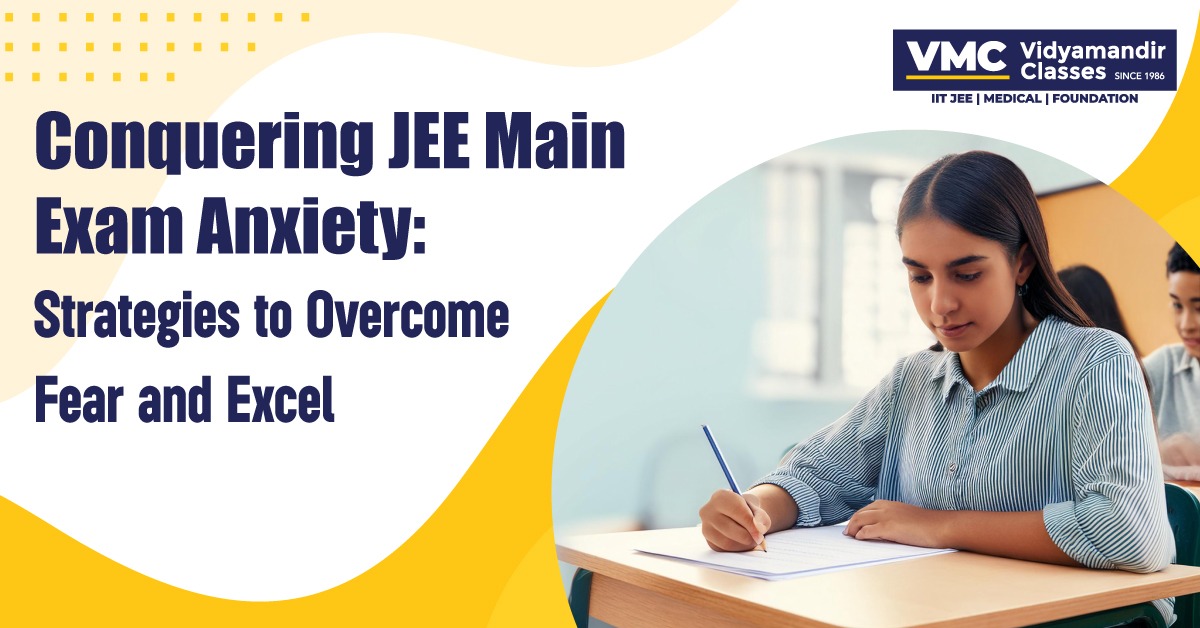Conquering JEE Main Exam Anxiety: Strategies to Overcome Fear and Excel
 Posted On
Posted On
101 total views, 2 views today
The Joint Entrance Examination (JEE) Main is among the toughest and most competitive exams in India, shaping the academic futures of thousands of aspiring engineers every year. With such high stakes, it’s no wonder that anxiety often takes center stage for many students. However, the fear and pressure associated with the exam can be managed effectively, leading to better performance and a healthier mindset. In this blog, we’ll explore proven strategies to overcome exam anxiety and excel in the JEE Main.
1. Mindset Shift: Transforming Fear into Opportunity
One of the most critical steps to conquer JEE Main anxiety is a shift in mindset. Many students view exams as judgment days, where every mistake feels like a reflection of their worth. This perception amplifies fear and can hinder performance. Instead, it’s essential to view the exam as an opportunity to showcase your knowledge and understanding.
Shift from Fear to Curiosity: Rather than dreading what might appear in the exam, treat each test as a chance to explore how well you’ve grasped the concepts. The exam is not an insurmountable challenge but a tool to measure your progress. This perspective shift will not only reduce anxiety but also help you focus on mastering the syllabus rather than fixating on unpredictable outcomes.
Focus on Understanding, Not Memorization: Often, students fall into the trap of rote learning, which may lead to temporary recall but fails under pressure. Embrace a deeper understanding of concepts, which will build your confidence and reduce anxiety about what will appear in the exam.
2. Structured Study Schedule: Consistency Over Cramming
One of the best ways to reduce exam anxiety is to maintain a structured study routine. JEE Main covers a vast syllabus, and trying to cram all the material last minute can leave you feeling overwhelmed and anxious. A disciplined and consistent study schedule is the antidote to this problem.
Consistency is Key: Set aside specific times each day for study and revision. Break the syllabus into manageable chunks, and set weekly or monthly goals to track your progress. Consistent preparation throughout the year will prevent the need for frantic, last-minute studying, reducing stress and allowing you to approach the exam with a calm mindset.
Balance Study with Breaks: Avoid burnout by incorporating short breaks in your study routine. Use techniques like the Pomodoro method (25 minutes of focused study followed by a 5-minute break) to keep your mind fresh and focused. These regular intervals will boost productivity and keep anxiety at bay.
3. Persistence Pays Off: Turning Setbacks into Motivation
It’s common to feel behind in preparation, especially when comparing yourself to others or facing a series of tough practice exams. However, instead of giving up or panicking, use setbacks as motivation to push forward.
Reflect and Adjust: If you feel your preparation is lacking, don’t let this demoralize you. Instead, reflect on your past performance and identify areas of weakness. Create a new strategy that addresses these areas and maximizes your potential for improvement. Remember, setbacks are a natural part of the learning process and do not define your final result.
Keep the Long-Term in View: Persistence is vital. Remind yourself that JEE Main is a marathon, not a sprint. By putting in consistent effort, you can make significant strides, even if progress seems slow at times. The key is to stay focused on the bigger picture rather than letting temporary setbacks dictate your approach.
4. Present Moment Focus: Staying Grounded in the Now
Anxiety often arises from concerns about what might happen in the future. For many students, the fear of failure, rejection, or missing out on their dream college is ever-present. However, focusing on the present moment is a powerful strategy to reduce anxiety and improve concentration.
Be Here Now: Instead of dwelling on the exam day or your future results, concentrate on the actionable steps you can take in the present. Gather your study materials, engage in a focused study session, and remind yourself that each moment spent studying is a step closer to success. Breaking down your preparation into smaller, manageable tasks can prevent feelings of overwhelm.
Mindfulness and Relaxation Techniques: Mindfulness practices such as meditation and deep breathing exercises can help bring your focus back to the present moment. A few minutes of mindful breathing or guided relaxation can ease tension, allowing you to refocus on your work with a clear and calm mind.
5. Positive Goal Setting: Growth Over Perfection
Another common source of anxiety is the pressure to achieve perfection. Students often set unrealistic goals for themselves, and when they fall short, they feel discouraged. To avoid this, focus on setting positive, achievable goals that encourage growth rather than unattainable perfection.
Set SMART Goals: Create Specific, Measurable, Achievable, Relevant, and Time-bound (SMART) goals for your preparation. For example, instead of aiming to score 100% in mock tests, focus on improving your score by 5% each week. This shift in goal-setting will foster a growth mindset, where the emphasis is on continual improvement rather than an all-or-nothing approach.
Celebrate Small Wins: Reward yourself for small achievements. Whether it’s mastering a difficult concept, completing a challenging practice paper, or simply sticking to your study schedule, these small wins add up. Recognizing them helps build confidence, which in turn reduces anxiety and creates a positive feedback loop of improvement.
Final Thoughts: A Balanced Approach to Success
Overcoming JEE Main anxiety requires a combination of mental, emotional, and practical strategies. By shifting your mindset, maintaining a structured study schedule, persevering through setbacks, staying grounded in the present moment, and setting positive goals, you can significantly reduce exam-related stress.
Remember, success in the JEE Main is not just about how much you know but also about how well you manage your mental and emotional state. A balanced approach that prioritizes both preparation and well-being will not only help you excel in the exam but also cultivate lifelong skills for managing high-pressure situations.
Keep these strategies in mind as you continue your preparation, and always believe in your potential to succeed. With the right mindset and approach, you can conquer your fears, excel in the JEE Main, and step confidently towards your future goals.



